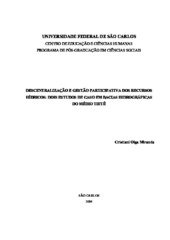Descentralização e gestão participativa dos recursos hídricos: dois estudos de caso em bacias hidrográficas do médio Tietê
Abstract
Abstract
This work had as objective the analysis of the ways and the dynamic of civil society
participation on the water resources management in the State of São Paulo. Advocated on the
state legislation that established the Water Resources Management Integrated System, the
participation of civil society organized entities is considered one of the main fundaments of water
resources state policy and system, created by the law 7663/91, that are explicit oriented by a
model of integrated, decentralized and participative management of the water. The bases of the
management system are the hydrographical basin committees: deliberative commissions with
three kinds of representation, with equal participation of state government, local prefectures and
organized civil society of the region. The water resources management in the State of São Paulo
can be seen as a propelling focus of changes in the public administration, because this sector
organization advances in the direction of a participative democracy, articulating governments and
civil society in more transparent decision structures, representing the different interests, searching
to guarantee the conflicts regulation and the governance of complex aspects of the actual socioenvironmental
dynamic. In the actual model of the water resources institutional organization, the
participation is understood as an instrument to make feasible and legitimize the intervenient
public policies. However, it s possible that the effective participation of civil society is merely
punctual and restricted, because it depends of the decentralized actions of regulation in the scope
of each committee and other favorable conditions. Based on interviews, bibliographical,
documental and field research, combined with the accompaniment of the actuation of
Piracicaba/Capivari/Jundiaí and Tietê/Jacaré Basin Committees, it was intended to characterize
the civil society participation on these forums, analyzing the main actors involved, its ways and
channels of action. On this perspective, the results suggests important institutional innovations on
environmental public policies, but indicates that the participative process don t exclude the
imbalance of institutional forces and arrangement, which can undermine the participative
democracy principle on the Hydrographical Basins Committees.
